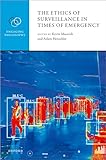The ethics of surveillance in times of emergency [electronic resource] / Kevin Macnish, Adam Henschke.
Publication details: New York : Oxford University Press, c2023.Edition: First editionDescription: 232 pagesContent type:- text
- computer
- online resource
- 9780192864918
- 9780192688316
| Item type | Current library | Call number | Status | Date due | Barcode | |
|---|---|---|---|---|---|---|
 eBooks
eBooks
|
Digital Library | Available |
Cover
The Ethics of Surveillance in Times of Emergency
Copyright
Contents
Acknowledgement
List of Contributors
Introduction
Democracy in Times of Emergency
Ethics in Times of Emergency
Ethics by Design in Surveillance Programmes
References
Part I: Democracy in Times of Emergency
1: Pandemic Population Surveillance: Privacy and Life-Saving
The Case of South Korea
Test, Track, and Trace in the UK
An Architecture of Oppression?
Conclusion
References
2: No States of Exception: A Neo-Republican Theory of Just Emergency Powers
A Neo-Republican Conception of Emergency
The Roman Dictatorship
A Neo-Republican Account of Just Emergency Powers
Conclusion
References
3: Combating Covid-19: Surveillance, Autonomy, and Collective Responsibility
Technology Responses to the Pandemic
Ethical Analysis
Privacy and Autonomy
Collective Responsibility
Conclusion
References
4: Big Data as Tracking Technology and Problems of the Group and Its Members
Use of Big Data Analytics to Target Persons or Groups
Key Ethical Issues
Ethical Concerns Raised by the Targeting of a Person as a Member of a Group
Consent
Social Justice and Fairness
Privacy
Ethical Concerns Raised by Targeting a Group Qua Group
Current Measures to Address the Identified Issues
Protecting Persons against Harms
Protecting Groups against Harms
Group Rights to Privacy
Conclusion and Recommendations to Improve Current Measures
References
5: Epistemic Dimensions of Surveillance in Public Health Emergencies: Risks of Epistemic Injustice and Dysfunctions of Trust
Introduction
Some Features of Public Health Emergencies, and Their Implications for Knowledge
Testimonial Injustice and Testimonial Smothering in Public Health Emergencies. Trust, Fairness, and Knowledge in Public Health Emergencies
Conclusion
References
Part II: Ethics in Times of Emergency
6: Surveillance without 'Baddies': Liability and Consent in Non-Antagonistic Surveillance Ethics
Liability of (Potential) Infection Bearers
Consent of Liable Bearers of Infectious Diseases and Tracing Apps
Why Consent Might Matter Morally, Despite Liability
Conclusion
References
7: Digital Contact Tracing Applications (DCTAs): Public Health Ethics and Emergency Surveillance
Introduction
DCTAs: A Look at How the Technology Works and Approach Taken to Implement Their Use
How DCTAs Work
Approaches Taken in Using DCTAs
In Support of DCTAs
Early Detection
DCTAs Indirectly Contribute to Reducing Lockdowns and Burden on Healthcare System
DCTAs, Autonomy, and Informed Consent
A Bioethics Approach
A Public Health Ethics Approach
Conclusion
References
8: Surveillance, Democracy, and Protest in a Time of Climate Crisis
The Ethics of Police Surveillance of Protest: Privacy and the Chilling Effect
Police Surveillance of Protest Movements: Tactics and Practices
Overt Surveillance during Protests and Assemblies and Immediately before and after Them
Surveillance of Non-Protest Gatherings: Meetings, Camps, Workshops, Etc
Undercover Policing: Infiltration
Conceptualizing the Impact of Surveillance on Protest Mobilization: The Limits of the 'Chilling Effect'
References
9: The Dynamics of Public Health Ethics: Covid-19 and Surveillance as Justifiable but Abnormal
Covid-19 Driving New Surveillance Practices
Public Health Ethics Normalizing New Surveillance
Public Health Ethics as Dynamic
Ensuring That Surveillance Remains Abnormal
References
Part III: Ethics by Design in Surveillance Programmes. 10: Ethical Requirements for Digital Systems for Contact Tracing in Pandemics: A Solution to the Contextual Limits of Ethical Guidelines
Introduction
Morley et al.'s Guidelines
My Proposed Guidelines
How to Protect against Contextual Change
Conclusion
References
11: An Unexceptional Theory of Morally Proportional Surveillance in Exceptional Circumstances
The Qualitative Difference View of Proportional Surveillance in Exceptional Circumstances
Against the Qualitative Difference View
An Unexceptional Theory of Proportional Surveillance
Conclusion
References
12: Technofixing Surveillance: A Proportionate Response?
Proportionality
Efficacy of Technology
Harms of Apps
Alternatives
Conclusion
References
Index
"The COVID-19 pandemic is arguably the first international emergency of the 21st century. In order to respond to this emergency, countries and governments around the world were forced to engage in a range of actions and policies that would not otherwise have been permitted. Looking in particular at the use of surveillance technologies, this book examines the challenge of ethics in emergencies. What can states do to keep their populations safe, what can citizens expect of their governments, and when are those government actions unjustified? By looking at the use of surveillance in times of emergency, this book explores ethical, philosophical, political, and social concepts, challenges them, and offers a set of views on where those concepts may evolve into the future. As a global population, we will be faced with emergencies, and it is possible that these will also be global in their impact. The ethics of surveillance in times of emergency is both of its time, and ongoing; we must learn our lessons from the last emergency, to be prepared for the next ones"--


